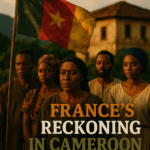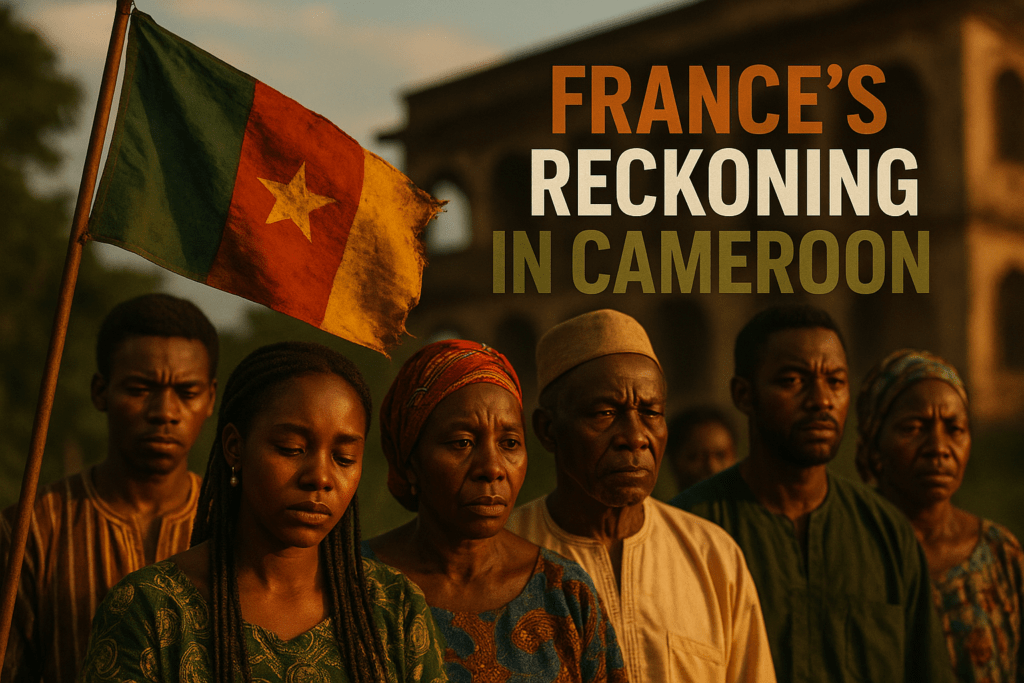

France's Reckoning in Cameroon
By Darius Spearman (africanelements)
Support African Elements at patreon.com/africanelements and hear recent news in a single playlist. Additionally, you can gain early access to ad-free video content.
French President Emmanuel Macron has made a historic admission, acknowledging France's direct role in a “repressive war” during Cameroon's struggle for independence (africanews.com). This marks the first time France has officially used the term “war” to describe its actions in the West African nation. This significant acknowledgment was detailed in a document released on Tuesday, based on a letter Macron sent to Cameroonian President Paul Biya on July 30. The admission takes responsibility for acts of repressive violence against insurgent movements in Cameroon, both before and after the country gained independence in 1960 (africanews.com). This move is part of a broader effort by Macron's presidency to confront France's colonial past and acknowledge its historical responsibilities.
The “repressive war” in Cameroon refers to the violent military campaign waged by France in the late 1950s and early 1960s. This campaign aimed to suppress the independence movement, particularly the Union of the Peoples of Cameroon (UPC). This period, often called France's “dirty war” in Cameroon, involved widespread violence, massacres, forced displacement, and the targeting of political dissidents (mediapart.fr). It resulted in tens, possibly hundreds of thousands of deaths. This conflict differed from other forms of colonial repression due to its scale, intensity, and the explicit use of military force to prevent true independence and eradicate political opposition (mediapart.fr). The war continued even after Cameroon gained independence, with the goal of eradicating any dissenting political ideas (mediapart.fr). This conflict is often described as the least known contemporary French war (mediapart.fr). Many Cameroonians have recounted France's “dirty war” against their independence movement (africanews.com).
Historical Reckoning
President Macron's statement is rooted in a report compiled by historians. This report, presented to both France and Cameroon in January, concluded that French troops were responsible for a significant number of deaths in Cameroon (africanews.com). The findings indicate that French troops “probably killed tens of thousands of Cameroonians” between 1945 and 1971 (africanews.com). This historical account aligns with previous reports detailing France's “dirty war” against the independence movement (africanews.com).
The historical commission report that formed the basis for Macron's admission was likely part of a broader initiative by the French government to confront its colonial past. While specific details about this particular commission's methodology and scope are not fully detailed, it is known that a French-Cameroonian commission was established to shed light on the colonial era (africanews.com). Such commissions typically involve historians and researchers from both countries. They are tasked with examining archival documents, testimonies, and other historical evidence to provide a comprehensive and objective account of past events. The establishment of such a commission indicates a move towards greater transparency and acknowledgment of historical truths (africanews.com).
Targeting Independence Leaders
Macron specifically acknowledged the killings of independence leaders and specific massacres carried out by French colonial forces (africanews.com). He admitted to France's role in the murder of Ruben Um Nyobè in 1958, a prominent leader of the Union of the Peoples of Cameroon (africanews.com). The Ekité massacre, which occurred on December 31, 1956, and resulted in the deaths of at least dozens of people, was also acknowledged (africanews.com).
The Union of the Peoples of Cameroon (UPC) was a significant nationalist political party that played a central role in Cameroon's struggle for independence from French colonial rule. Founded in 1948, its primary goals included the reunification of British and French Cameroons and immediate independence. The UPC gained substantial popular support but was eventually outlawed by the French administration, leading to an armed struggle. Its leaders, such as Ruben Um Nyobè and Félix Moumié, were systematically targeted and killed (mediapart.fr). This effectively decapitated the movement and paved the way for a more compliant post-independence government. The French government engaged in a “dirty war” against the independence movement in Cameroon, which included targeting leaders of the UPC (mediapart.fr). The war aimed to prevent independence and to eradicate any divergent political ideas, implying the UPC's ideas were considered divergent (mediapart.fr). Many Cameroonians recount France's “dirty war” against the independence movement, which the UPC spearheaded (africanews.com).
The Ekité Massacre is one of the many violent episodes that occurred during France's “repressive war” in Cameroon. While specific details about the circumstances, reasons, and immediate aftermath of the Ekité Massacre are not widely available, it is understood to be an instance where dozens of people were killed as part of the broader French military operations aimed at suppressing the UPC and other independence movements. These massacres were often characterized by indiscriminate violence against civilians suspected of supporting the nationalist cause. This contributed to the high death toll and the brutal nature of the conflict (mediapart.fr). The “dirty war” in Cameroon involved widespread violence and massacres, leading to tens, possibly hundreds of thousands of deaths (mediapart.fr). The war aimed to eradicate any political ideas divergent from French interests, suggesting that massacres like Ekité were part of this suppression (mediapart.fr). Cameroonians have recounted France's “dirty war” against the independence movement, which included violent events and massacres (africanews.com).
The Human Cost of Repression
During France's “repressive war” in Cameroon, forced displacement and the establishment of internment camps were significant aspects of the counter-insurgency strategy. While specific details on the scale or conditions of these camps are not explicitly provided, historical accounts indicate that large numbers of Cameroonians were forcibly relocated from their homes. This was often done to isolate them from independence fighters or to control populations. These camps were characterized by harsh conditions, including overcrowding, lack of sanitation, food shortages, and disease. This led to significant loss of life and immense suffering. The impact on Cameroonian society was profound, leading to the destruction of communities, the disruption of traditional livelihoods, and long-lasting trauma (mediapart.fr). The “dirty war” in Cameroon involved widespread violence and efforts to eradicate dissenting political ideas, which would necessitate population control measures like forced displacement and internment (mediapart.fr). The war resulted in tens, perhaps hundreds of thousands of deaths, indicating a high human cost that would include those from forced displacement and internment (mediapart.fr).
After Cameroon gained independence in 1960, French involvement in its governance continued through various mechanisms. This significantly influenced the country's political trajectory and contributed to the establishment of an authoritarian and autocratic regime. This influence included economic ties, military agreements, and political support for leaders amenable to French interests. France often backed leaders who suppressed opposition and maintained close ties with Paris, ensuring the continuity of French economic and strategic influence. This post-independence involvement often undermined democratic development, fostered corruption, and entrenched a political system that prioritized stability and French interests over the aspirations of the Cameroonian people for genuine self-determination (mediapart.fr). The “dirty war” continued after independence to eradicate any divergent political ideas, indicating French influence on the post-independence political landscape (mediapart.fr). The French government's actions were aimed at preventing true independence, suggesting a desire to maintain control even after formal independence (mediapart.fr).
Cameroon Independence War — Civilian Deaths
Estimated civilians killed by French troops
Macron's Broader Acknowledgments
Emmanuel Macron's presidency has been marked by efforts to confront France's colonial past and acknowledge its historical responsibilities. He has previously acknowledged France's role in the 1944 Thiaroye massacre (africanews.com). In this tragic event, up to 400 Senegalese soldiers who fought for France in WWII were killed by French colonial troops (janataweekly.org). He has also acknowledged France's role in the 1994 Rwanda genocide and the Algerian war of independence (africanews.com).
These events represent other significant instances of French colonial violence and its aftermath that President Macron has acknowledged. The Thiaroye Massacre occurred in December 1944 in Thiaroye, Senegal. French forces opened fire on unarmed Senegalese tirailleurs (soldiers) who were protesting unpaid wages and poor conditions after fighting for France in World War II. Hundreds were killed or wounded. Regarding the Rwanda Genocide, while France's direct involvement is a subject of ongoing debate, Macron has acknowledged France's “overwhelming responsibility” in the 1994 genocide (aa.com.tr). This includes its role in supporting the Hutu-led government that perpetrated the atrocities and its failure to prevent the mass killings. The Algerian War of Independence (1954-1962) was a brutal conflict that led to Algeria's independence from France. It was marked by widespread torture, massacres, and repression by French forces, as well as violent acts by Algerian nationalists. Macron has made several acknowledgments regarding French atrocities during this war, including the use of torture and the killing of Algerian independence figures. These acknowledgments collectively demonstrate a shift in France's official stance towards its colonial past, moving towards greater recognition of the violence and injustices committed (africanews.com).
Key Acknowledgments by President Macron
Timeline of significant historical acknowledgments made by President Macron. Source: africanews.com
Critiques and Future Steps
Despite these efforts, Macron has faced criticism for perceived “neo-colonial paternalism” in his approach to Africa (courthousenews.com). “Neo-colonial paternalism” refers to a critique of the continued, albeit indirect, influence and control exerted by former colonial powers over their former colonies. This often occurs under the guise of aid, development, or cultural exchange. This “paternalism” implies a condescending attitude, where the former colonizer assumes a superior position, dictating terms or offering “guidance” that ultimately serves its own interests rather than genuinely empowering the former colony. Criticism of Macron's approach as neo-colonial paternalism arises when his acknowledgments or initiatives are perceived as performative gestures that do not lead to substantive changes in power dynamics, economic relations, or genuine accountability for past wrongs. It suggests that while he may acknowledge historical injustices, the underlying framework of French dominance and influence in Africa remains largely intact, perpetuating a relationship of dependency rather than true equality (aa.com.tr).
The provided information does not explicitly state whether Macron or the French government plans any formal reparations or concrete measures following the acknowledgment of France's “repressive war” in Cameroon. However, the establishment of a French-Cameroonian commission to shed light on the colonial era suggests a step towards historical reconciliation. This could potentially pave the way for future discussions on reparations or other forms of redress (africanews.com). The broader context of “Africa awaiting closure of French colonial crimes” indicates that the issue of reparations and formal apologies remains a significant concern for many (aa.com.tr). Macron's acknowledgments are often seen as a starting point rather than a definitive resolution. Prior instances where former colonial powers expressed 'regrets' suggest a precedent for acknowledgments, but not necessarily immediate reparations (africanews.com).
The provided information does not offer specific details on the immediate reactions of Cameroonian leaders, civil society, or the public to Macron's admission. However, the existence of a French-Cameroonian commission to examine the colonial era suggests a degree of engagement and a desire for historical truth from the Cameroonian side. Given the long-standing impact of the “dirty war” and the suppression of the independence movement, it is highly probable that reactions would range from cautious welcome to demands for further accountability, including reparations and a more comprehensive acknowledgment of the suffering endured. The fact that Cameroonians are “recounting France's 'dirty war'” indicates a strong public memory and a desire for recognition of their historical experiences (africanews.com).
Impacts of French Colonial Governance Post-Independence
Key aspects of continued French influence in Cameroon post-independence. Source: mediapart.fr
ABOUT THE AUTHOR
Darius Spearman has been a professor of Black Studies at San Diego City College since 2007. He is the author of several books, including Between The Color Lines: A History of African Americans on the California Frontier Through 1890. You can visit Darius online at africanelements.org.
